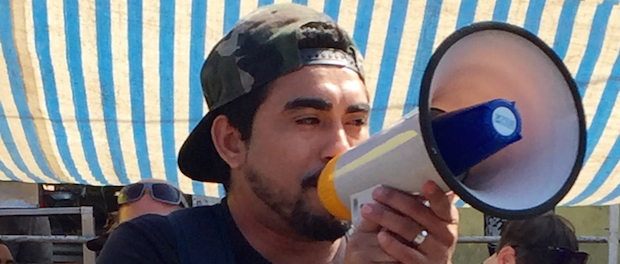
For the original article by Raull Santiago* in Portuguese published by Coletivo Papo Reto click here.
We live in a society where the spectacle of pain is something that can be commercialized, so it’s no coincidence that in the mainstream media 99% of what we see or hear about is violence, especially when the topic is the favela.
If we smash the televisions or wring out the newspapers, you can be sure that blood will flow–our blood.
But what is behind all of this? It’s obvious! Prejudices, stereotypes, racism, conjectures, and people not wanting to actually get to know first-hand the people and places being discussed.
A simple example of this is that it might be possible to mobilize a number of spotlights when a rifle goes off in a favela, but little to nothing gets reported when a cultural activity takes place, except in the independent media.
It’s a little different when the vehicle of communication is “gringo,” or from abroad. Their participation and work on a story becomes closer and more complex because often they are far away from the vices of presuppositions created by those in Brazil. This allows for a more genuine approximation, or, perhaps, they are simply more committed to the story, like independent media.
Clearly, the violence exists and must be exposed. It is real and it is present. But we must move beyond this topic, because it is not the only one that exists in the favela. When we focus solely on this issue, it perpetuates itself.
Coletivo Papo Reto itself is a collective working to communicate these various issues on violations of rights, which are always present, and striving to show the positive side, which is a form of resistance. The difference is that we expose violations through our own lived experiences. We don’t ‘think,’ we know.
It’s worth noting that this post is about communication, not about public/private insecurity in the favelas. But from the point of view of a resident of a favela, I see that our exposure in the media is always when the police are involved and worse, concludes with a comment from the police downplaying very serious situations, like #JusticeforEduardo.
This type of constant [grassroots] reporting is intense and hard. But all forms of informative communication should make looking and thinking through the lens of citizenship a core principle. This is an important exercise, and is growing among those who discuss forms of communication.
Have you noticed how those in power only look at the favela through the barrel of the police rifle?
Have you also noticed that the mainstream media are always “at the heels” of the police? One has to reinvent oneself to survive in the era of choices, of the “multimedia self” communication, of the power of “I see what I want to see and where I want to see it.”
The phrase that goes “I want to go on air and speak live with no editing” means a lot!
I believe that Internet channels and cable TV will grow to be on equal footing. This is already happening with the power of being able to choose what one wants to watch and when.
Meanwhile open television networks where viewers act as passive receptors of information are tending to lose ground and are maintaining themselves through interactions on social networks. If they’re smart, they’ll get closer to the new communicators, humbly seeking out partnerships to work collaboratively towards a social goal.
Entertainment, on the other hand, will survive on open television, but the forms that narrate “the other” are increasingly losing ground because “the other” can already speak for himself or herself, by him or herself.
Either an effort is made to listen to the other side or, if they speak over it, you’ll get examples like Brazilian soap operas, which will become embarrassing and shallow because of the way they imitate and repeat themselves, over and over, losing force. All we have to do is look at the latest ratings to see that Narcos is the future.
In light of the human chaos of corruption scandals, the destruction of our planet, and a trivialization of life, a more humane point of view that takes citizenship into account is the way to survive in the advance of communication.
Today, we see that attention is highly disputed with the click of the Refresh button, the scroll of the mouse, or the scheduled alert that diverts your attention, telling you that your show on the cable TV channel is about to start.
In the era of “multimedia self,” communication is done in blocks. The power is that of choice and being able to capture someone’s full attention is almost impossible…
Are you going to try to tell me you read this whole text through in a single go? Or that you don’t watch TV with your cell phone or laptop at hand, sharing your attention with them?
It’s more likely you’re reading my text on your cell phone than on your computer or, if you’re at home, that your TV is on and that you don’t even remember which show you were watching.
And now you’ve stopped paying attention to the text to see if this is actually the case. But that’s all right, I’ve finished anyway.
*Raull is an organizer of the Coletivo Papo Reto media collective in Complexo do Alemão


